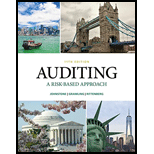
Auditing: A Risk Based-Approach (MindTap Course List)
11th Edition
ISBN: 9781337619455
Author: Karla M Johnstone, Audrey A. Gramling, Larry E. Rittenberg
Publisher: Cengage Learning
expand_more
expand_more
format_list_bulleted
Question
Chapter 6, Problem 8RQSC
To determine
Introduction:
Selection of samples is a critical process while collecting samples. It required special skill with respect to
To explain: The factors that affect the sample size used during testing controls.
Expert Solution & Answer
Trending nowThis is a popular solution!

Students have asked these similar questions
no aiOne company might depreciate a new computer over three years while another company might depreciate the same model computer over five years...and both companies are right.
True
False
no ai
An asset's useful life is the same as its physical life?
True
False
no ai
Depreciation Expense reflects an allocation of an asset's original cost rather than an allocation based on the economic value that is being consumed.
True
False
Chapter 6 Solutions
Auditing: A Risk Based-Approach (MindTap Course List)
Ch. 6 - Prob. 1CYBKCh. 6 - Prob. 2CYBKCh. 6 - Prob. 3CYBKCh. 6 - Which of the following statements is true...Ch. 6 - Prob. 5CYBKCh. 6 - Prob. 6CYBKCh. 6 - Prob. 7CYBKCh. 6 - Prob. 8CYBKCh. 6 - Prob. 9CYBKCh. 6 - Prob. 10CYBK
Ch. 6 - Prob. 11CYBKCh. 6 - Prob. 12CYBKCh. 6 - Prob. 13CYBKCh. 6 - Prob. 14CYBKCh. 6 - Prob. 15CYBKCh. 6 - Prob. 16CYBKCh. 6 - Prob. 17CYBKCh. 6 - Prob. 18CYBKCh. 6 - Prob. 19CYBKCh. 6 - Prob. 20CYBKCh. 6 - Prob. 1RQSCCh. 6 - Prob. 2RQSCCh. 6 - Prob. 3RQSCCh. 6 - Prob. 4RQSCCh. 6 - Refer to Exhibit 6.2 and describe the differences...Ch. 6 - Prob. 6RQSCCh. 6 - Prob. 7RQSCCh. 6 - Prob. 8RQSCCh. 6 - Prob. 10RQSCCh. 6 - Prob. 11RQSCCh. 6 - Prob. 12RQSCCh. 6 - Prob. 13RQSCCh. 6 - Prob. 14RQSCCh. 6 - Prob. 15RQSCCh. 6 - Indicate how the auditor could use substantive...Ch. 6 - Prob. 17RQSCCh. 6 - Prob. 18RQSCCh. 6 - Prob. 19RQSCCh. 6 - Prob. 20RQSCCh. 6 - Prob. 21RQSCCh. 6 - Prob. 22RQSCCh. 6 - Prob. 23RQSCCh. 6 - Prob. 24RQSCCh. 6 - Prob. 25RQSCCh. 6 - Prob. 26RQSCCh. 6 - Prob. 27RQSCCh. 6 - Prob. 28RQSCCh. 6 - Prob. 29FFCh. 6 - Prob. 30FFCh. 6 - Prob. 31FFCh. 6 - Prob. 32FFCh. 6 - Prob. 33FFCh. 6 - MINISCRIBE (LO 1, 2) As reported in the Wall...
Knowledge Booster
Similar questions
- The purpose of depreciation is to have the balance sheet report the current value of an asset. True Falsearrow_forwardDepreciation Expense shown on a company's income statement must be the same amount as the depreciation expense on the company's income tax return. True Falsearrow_forwardDont use AI Give soln.arrow_forward
arrow_back_ios
SEE MORE QUESTIONS
arrow_forward_ios
Recommended textbooks for you
 Auditing: A Risk Based-Approach (MindTap Course L...AccountingISBN:9781337619455Author:Karla M Johnstone, Audrey A. Gramling, Larry E. RittenbergPublisher:Cengage Learning
Auditing: A Risk Based-Approach (MindTap Course L...AccountingISBN:9781337619455Author:Karla M Johnstone, Audrey A. Gramling, Larry E. RittenbergPublisher:Cengage Learning Auditing: A Risk Based-Approach to Conducting a Q...AccountingISBN:9781305080577Author:Karla M Johnstone, Audrey A. Gramling, Larry E. RittenbergPublisher:South-Western College Pub
Auditing: A Risk Based-Approach to Conducting a Q...AccountingISBN:9781305080577Author:Karla M Johnstone, Audrey A. Gramling, Larry E. RittenbergPublisher:South-Western College Pub

Auditing: A Risk Based-Approach (MindTap Course L...
Accounting
ISBN:9781337619455
Author:Karla M Johnstone, Audrey A. Gramling, Larry E. Rittenberg
Publisher:Cengage Learning

Auditing: A Risk Based-Approach to Conducting a Q...
Accounting
ISBN:9781305080577
Author:Karla M Johnstone, Audrey A. Gramling, Larry E. Rittenberg
Publisher:South-Western College Pub